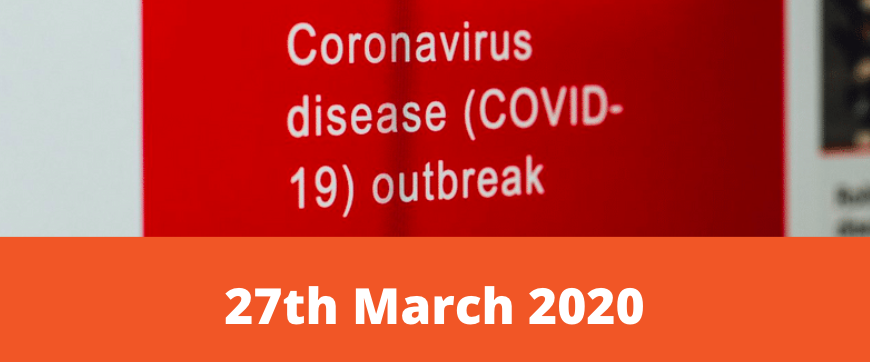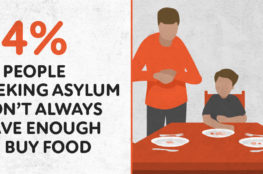Our weekly summary of ongoing advocacy initiatives, interesting surveys and research, government developments and useful resources. Contact us if you’d like to get this update directly into your inbox!
1. Ongoing advocacy initiatives
Stop Lock Change Evictions letter to Mears, Serco and Home Office
This week Scottish Refugee Council, alongside other members of the Stop Lock Change Evictions campaign, have written to Mears, Serco and the Home Office to ask them to take three key measures to ensure people seeking asylum are kept safe during the COVID 19 pandemic, including no evictions or immigration raids during the COVID 19 pandemic; fully instating accommodation and support for all who need it; and fully funding providers to accommodate and support additional people during this period. You can find the published letter here.
2. New ASAP guidance on asylum support and Covid 19
ASAP have produced a new factsheet setting out changes in eligibility for asylum support as a result of Covid-19, in particular eligibility for Section 4 for people who do not have fresh claims.
3. Letter from Minister for Local Government and Homelessness to all LAs in England
The Minister for Local Government and Homelessness has written to all Local Authorities requesting that rough sleepers and other vulnerable homeless people are supported into appropriate accommodation by the end of this week. The letter makes clear this provision includes people with No Recourse to Public Funds (NRPF) condition.
4. Asylum Appeals and Judicial Review Hearings – no face-to-face hearings
From 25th March, no face-to-face appeal hearings will be listed at the First-tier Tribunal. Until at least 30th April, judges will conduct Case Management Review (CMR) Hearings by telephone to decide if the case can be decided on the papers (without a hearing). If a full hearing needs to go ahead, this will be done by video. The Upper Tribunal have cancelled almost all listed hearings including Judicial Reviews. Further information on the process can be found on the ILPA website here.
5. NHS – Registration of the Extremely Vulnerable
The Home Office has circulated the following note advising how people who have a medical condition that makes them extremely vulnerable can register this with the NHS.
“You will have seen recent media coverage of the NHS’ plans to write to 1:5m people currently identified as vulnerable to the worst effects of the COVID-19 virus. https://www.gov.uk/coronavirus-extremely-vulnerable
The link allows for extremely vulnerable people to be registered with the NHS. As the link details asylum seekers can register themselves or others can register on their behalf, which will obviously include colleagues within the NGO / VCS sectors. This includes the asylum seeking population if they are in scope of the categories as below.
Those who might be in scope of this include:
Solid organ transplant recipients
People with specific cancer
- People with cancer who are undergoing active chemotherapy or radical radiotherapy for lung cancer
- People with cancers of the blood or bone marrow such as leukaemia, lymphoma or myeloma who are at any stage of treatment
- People having immunotherapy or other continuing antibody treatments for cancer
- People having other targeted cancer treatments which can affect the immune system, such as protein kinase inhibitors or PARP inhibitors
- People who have had bone marrow or stem cell transplants in the last 6 months, or who are still taking immunosuppression drugs
People with severe respiratory conditions including all cystic fibrosis, severe asthma and severe COPD
People with rare diseases and inborn errors of metabolism that significantly increase the risk of infections (such as SCID, homozygous sickle cell)
People on immunosuppression therapies sufficient to significantly increase risk of infection
People who are pregnant with significant heart disease, congenital or acquired.
This provision in no way reduces the contractual obligations of providers. AASC and AIRE providers have received a version of this note and will be registering asylum seekers in the same way.”
6. Government Guidance Updated in Various Languages
The Government has produced translated Covid-19 guidance currently available in Arabic, Bengali, French, Mandarin, Cantonese, Gujarati, Punjabi, Polish, Portuguese, Urdu and Welsh.
Doctors of the World also have up-to-date guidance in 25 languages
7. Voluntary Returns suspended
The Home Office have confirmed that their Assisted Voluntary Returns Service has been put on hold.
8. DWP National Insurance Number interviews
The DWP has advised that National Insurance Number interviews are not currently taking place for 3 months effective from 17/03/2020 as a precautionary measure to protect people from unnecessary risk of exposure of coronavirus.
The DWP is making efforts to contact all customers to advise them not to attend DWP offices, and have confirmed that individuals do not need a National Insurance Number to apply for benefits or a job. Individuals can start work without a National Insurance Number as long as they have the right to work in the UK and employers have information to allow them to do this.
For further information around DWP Services during this current crisis please access the Coronavirus and claiming Benefits section on the Understanding Universal Credit website. The site is being updated regularly to provide the latest updates to customers and partners.
9. 350 people released from immigration detention
In response to a legal challenge from Detention Action, in the last week over 350 people have been released from immigration detention. The number of people held in immigration detention has now reduced from 1,225 on 1 January to 736 on 24 March.
The Home Office has also committed to urgently review the cases of every person held in immigration detention, and has halted the new detentions of persons liable to administrative removal to 49 countries.
Accepting evidence of the high level of risk posed by Covid-19 to those held in IRCs, the Home Office has also introduced a series of protective measures for detainees:
- Enhanced screening, identification and monitoring of those at risk or showing symptoms of Covid-19, particularly for this with underlying health conditions.
- Ensuring that persons at increased risk from Covid-19, and persons who are symptomatic, are provided with facilities to self-isolate in single-occupancy rooms and are provided with individualised care plans
- A review of cleaning practices within detention centres to ensure compliance with Public Health England guidance
- Provision of anti-bacterial cleaning materials to detainees, upon request
- The introduction of social spacing measures in communal areas
- The production of specific guidance to explain in clear terms how to reduce the risk of an outbreak of Covid-19
10. Useful Covid-19 Resources
A number of organisations have produced useful resources to help keep track of developments:
- The Refugee Council is tracking changes to Home Office Asylum and Resettlement Policy and Practice here.
- Right to Remain is tracking changes to the asylum and immigration process here.
- Free Movement is providing daily updates on the wider immigration system here.
- The West Midlands Strategic Partnership has compiled multilingual resources, official communications, official guidance and migration sector resources here.
- Migration Yorkshire has created the Migrant Information Hub, including simple Covid-19 guidance in multiple languages.
11. Home Affairs Select Committee Inquiry on Home Office Preparedness for Covid-19 – Deadline Extended
The Home Affairs Committee is undertaking an inquiry into the Home Office’s preparations for and response to Covid-19. They are calling for evidence on a range of issues, some of which might be of relevance to migration and asylum advocates, including: how the Home Office and its major contractors are working together to ensure the safe and effective operation of contracted services is maintained, particularly where these services affect vulnerable people; and the effectiveness of Home Office communications to its partners, responders and the wider public about its preparations. The deadline for evidence has been extended to the 21 April by noon – more details are available here.




